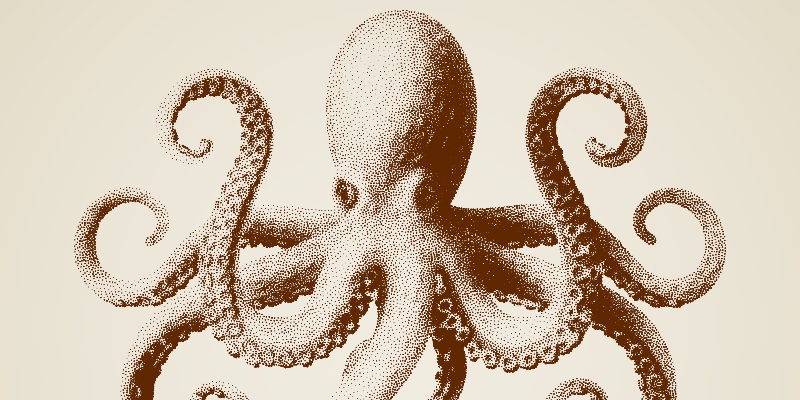I like to say my new novel, Underjungle, is a tale of love, loss, family, and war—set entirely underwater. So War and Peace, but three-thousand feet deeper. And considerably shorter. And maybe a little funnier, too. It’s also the story of an intelligent, meditative, and sometimes tempestuous species that discover a human body and the cascade of consequences to their world.
As I prepared to write it, I researched the novel in two very different ways. The obvious one was by poring through books on cephalopods, ichthyology, ocean science, and other forms of marine life. I’d written a lot about the ocean as a journalist, and I knew the importance of getting my facts right. But Underjungle is also a novel about the water, and what it’s like to live in it and call it home, relying on it for everything you have or know—whether it’s nourishment, minerals, mates, shelter, or ideas. We human beings live on land, but we live in the air. The only parts of us regularly on the ground are the soles of our feet.
But the water is a place full of surge, saturation, rhythms, waves, and tides. To live in the ocean is to submit to its currents and to be engulfed. So the second thing I did to write Underjungle was to put on a mask and fins—sometimes scuba diving, and other times free diving, mostly in Hawaii, where I live—and I simply sank. Nestled amid coral at 70 feet or hovering higher up with blue all around me, I watched the way the water coheres to itself, how it fills with particles and myriad forms of life, and the way the different creatures move through it, just as the water moves, itself. Until we understand what the ocean is—and how it isn’t so much a resource for minerals and food, but an environment for life we still barely understand—there will never be any real conservation, because the ocean will be something we study instead of something we love. In Underjungle, I call my invented species the yc. It’s the Mongolian word for water. And it’s pronounced almost like “us.”
The seven novels and one essay collection below all feature intelligent sea creatures who become part of our world, or else we enter theirs. Regardless of whether the sea creature is the hero or villain, ocean stories give us a chance to explore—or escape to—a shifting, drifting world that’s gracefully distanced from our terrestrial mess.
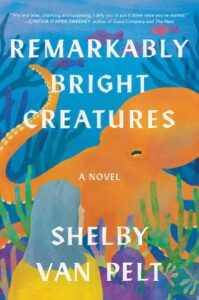
Shelby Van Pelt, Remarkably Bright Creatures
A person goes on a journey; a stranger comes to town. What if one of them’s a giant Pacific octopus, and the other two are bipeds from Sweden and Modesto, brought together by a mysterious connection that it will take an eight-armed detective to figure out? It’s possible that Van Pelt’s cephalopod Marcellus is the most-charming non-human character in contemporary fiction (with a soupçon of the world-weary awkwardness of Everything is Illuminated’s Alexander Perchov). Set around an aquarium in a fictional small Washington coastal town, Van Pelt’s novel is ultimately about discovering who we are—and how far our individual reaches go, whether we have two arms or substantially more.
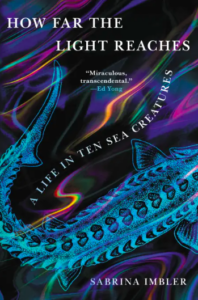
Sabrina Imbler, How Far the Light Reaches
This collection of 10 resonant essays told in glimmering prose delves deep into Imbler’s childhood and their growth into a queer trans bi-racial science writer. The creatures in this chapbook are a goldfish, octopus, sturgeon, sperm whale, yeti crab, sand striker (a terrifying mini-aquatic version of the sandworm from Dune that’s also been dubbed a Bobbitt worm, after Lorena), butterflyfish, salp, and cuttlefish. Which is the most intelligent? That’s not the right question. Which of them feels more profoundly, and expresses it with more tenderness, grace, incisiveness, lyricism, and self-effacing honesty? The answer is obvious, although it bears noting that an octopus can also manipulate a pen.
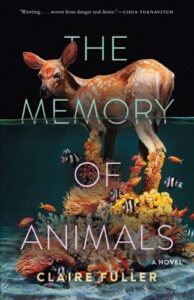
Claire Fuller, The Memory of Animals
This heart-thumper is a tale of isolation, loss, connectedness, memory-reproducing technology, and a whole lotta apocalypse. So why shouldn’t there also be an octopus in it? Surely, they’re the kings of connection, with all those arms and suckers. The novel is set mostly in confined spaces in England and open ones in Greece, against a backdrop of something a hundred times worse than Covid, which has wrought devastation on the planet—think Emma Donoghue’s Room, flushed with childhood recollections of life at the sea. Fuller’s novel drips with ache and desperation, but you’ll never feel either more than when its 27-year-old marine biologist narrator, Neffy, embraces an octopus and weeps.
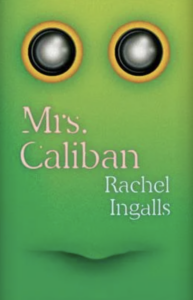
Rachel Ingalls, Mrs. Caliban
This anguished but fundamentally droll tale occupies the literary ground between Creature from the Black Lagoon and The Shape of Water. In this case, the six-foot-seven monster is Larry, and he’s really more of an amphibious lizardman than anything else. But a very polite one, with a lot of libido, good homemaking skills, a fondness for avocadoes, and a readiness to take a few risks, if in the soulfully jolly name of exploration. In short, he’s everything you’d want in a lover, except that he also kills a little too often in self-defense and isn’t particularly presentable, especially now that the cops are out looking for him. Throw in some affairs, a few beach scenes, mid-day cocktails, and ratcheting degrees of family trauma, and squeeze it all into 111 pages (plus a forward by Rivka Galchen), and, well, that’s it.
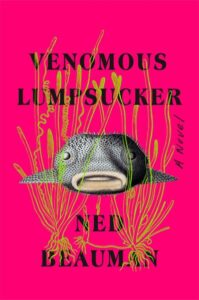
Ned Beauman, Venomous Lumpsucker
Behold the venomous lumpsucker: five-inches-long, greyish, googly-eyed, bumpy—and one of the most intelligent creatures on Beauman’s near-future version of the planet. Far nerdier than dangerous as individuals, they’re capable of killing out of revenge in schools, just because it makes them feel better. Now enter Karin Resaint, a Swiss-German animal-cognition scientist who has figured out how smart these little fish are and is determined to keep them alive as their habitat is threatened with destruction, while the Powers That Be speculate on the price of World Commission on Species Extinction credits and simultaneously try to rig that market. Which leads us to wonder who the real bottom-feeders are, and how any of us are to confront existential grief, in this rollicking, high-tech, and insidiously profound tale.
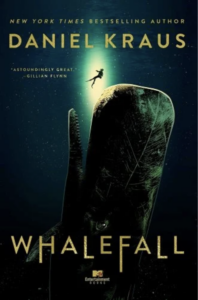
Daniel Kraus, Whalefall
Meet Jay, a disaffected teenager who goes scuba diving off Monterey to locate and retrieve his father’s skeletal remains, without an underwater light, gloves, knife, or a dive buddy. And now meet the 80-foot, 60-ton sperm whale who swallows him whole, and then keeps Jay clambering and clawing between the four chambers of its stomach, while his tank begins to run dry. Told in clipped sentences by one of the coauthors of The Shape of Water, there aren’t any dreamy sequences here. Just breathlessness, grit, a 30-foot giant squid that’s also trying to attack Jay from inside the whale’s stomach, plus a few flashbacks to time with his mother and sisters and his strained relationship with his dad, all of which have helped lead to this particular mess. Add stomach acid and methane, squishy soft tissue, peristaltic waves that squeeze both food and Jay along the whale’s alimentary canal, and a handy squid beak that embeds itself into Jay’s palm and helps dislodge the chip on his shoulder that 70 feet of ocean pressure couldn’t budge, plus a biblical amount of gore mixed in with the marine science and cetology…and then, well, you get it. Except that the whale’s also being attacked. So it’s an equal-opportunity horror story.
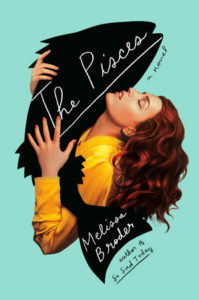
Melissa Broder, The Pisces
Lucy, who has just broken up with her longtime boyfriend, flees Phoenix, where she’s writing a dry dissertation on the missing passages of Sappho’s love poems, to dog-sit for her half-sister in Venice, where she meets a half-man/half-fish. As Broder points out, his lower half smells just like she does between her legs, and while they kiss she imagines eating his tail with garlic butter. It’s a novel with lines like “Fuck me with your Triton spear,” but this isn’t merely literary erotica. It’s also searing tale about self-annihilation. And it’s smart, as is the merman, Theo, who knows his Homer and Sappho, and is as in sync with Lucy’s menstrual cycle as he is with the moon and the tides—besides being instantly obsessed with her toes and feet as a prelude to her upper parts. But along with the camp, there’s great honesty and beauty in Broder’s sad and slightly sinister tale about compulsion and confronting what’s missing from life. Admits Lucy: “I didn’t know what it felt like to be a man or what it felt like to have a tail, but I certainly understood the prison of the body.”
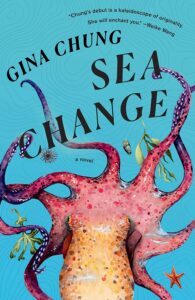
Gina Chung, Sea Change
What do you do if your boyfriend leaves for a colony on Mars and your best friend, a giant Pacific octopus named Dolores, is being sold to a private collector by the mall aquarium where you work, while your human best friend, is getting married and your friendship with her has begun to unravel (and also, maybe, you drink too much)? To complicate matters, your relationship with your mother has never been particularly fluid, the aquarium job’s a dead end, and the person who found the mutant octopus you practically grew up with is your father, a research scientist who disappeared in the “Bering Vortex” off Alaska 15 years earlier, in the same place that Dolores was found—a loss you’ve never come to terms with. For starters, you’d recognize the sea change you need is your own.
__________________________
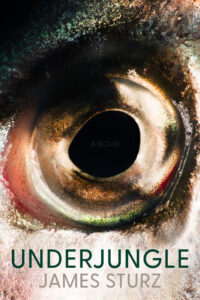
Underjungle by James Sturz is available now via Unnamed Press.
